They say… 
Best beer and travel writing award 2015, 2011 -- British Guild of Beer Writers Awards
Accredited Beer Sommelier
Writer of "Probably the best book about beer in London" - Londonist
"A necessity if you're a beer geek travelling to London town" - Beer Advocate
"A joy to read" - Roger Protz
"Very authoritative" - Tim Webb.
"One of the top beer writers in the UK" - Mark Dredge.
"A beer guru" - Popbitch.
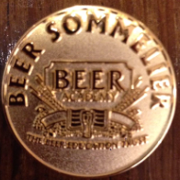
|
Beer sellers: Beermongers
ABV: 7.5%
Origin: Hood River, Oregon, USA
Website: http://farmhousebeer.com
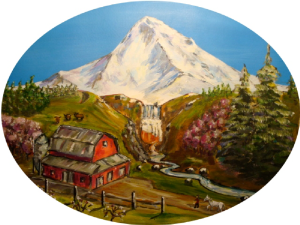 Logsdon Organic Farmhouse Brewery Dave Logsdon has more than an average brewer’s interest in yeast – he was a founder of renowned yeast culture supplier Wyeast, as well as being the original brewer at what’s now one of Oregon’s most successful craft breweries, Full Sail. So it’s perhaps not surprising that when he set up his own brewery early in 2011 with business partner Charles Porter, he turned to Belgium, with its array of weird, wonderful and wild yeast cultures, for inspiration.
This is a true farmhouse brewery in the style still occasionally found in Belgium and northern France, located on an organic farm in deep countryside south of the city of Hood River and some way east of Portland. The farm’s herd of Highland cattle feast on the spent grains, and some of the hops used is grown on site. Dave is currently raising a crop of genuine Schaarbeek cherries intended for future authentic krieks, and meanwhile the fruit beers utilise other locally grown ingredients.
The Seizoen is the brewery’s flagship beer, its spelling recalling the rare Limburg variant of the style, Sezoens Blond, brewed by Martens at Bocholt, but the beer itself owes at least as much to the classic saisons from Hainaut in French-speaking Belgium, and a good deal to individual imagination. This last factor accounts for the inclusion of locally sourced pear juice, added during fermentation though not especially present in the final flavour.
I sampled Logsdon Seizoen on draught, unfiltered and unpasteurised, at the Beermongers in Portland, but it’s also available bottle conditioned in 750ml bottles with beeswax-sealed caps. It poured a cloudy light amber with a sunshine glow and a fine yellowy head. There was a hint of orchard fruit on the creamy aroma – I noted apple but perhaps it was the pear – alongside orange and a pleasanty fruity, farmhouse-tinged yeasty touch.
A chewy palate had fruity estery notes but was well integrated and smooth, with notes of nuts and bruised apple emerging, and more fresh orange notes with touches of mint and pineapple. A pleasant finish coated the mouth with tangerine fruit, turning very lightly bitter with a hint of almond-like hops. A wonderfully refreshing, complex and elegant glassful and certainly one of the best saison-inspired US craft brews that I’ve encountered to date.
Beer sellers: Beermongers
ABV: 6.1%
Origin: Ashland, Oregon, USA
Website: www.calderabrewing.com
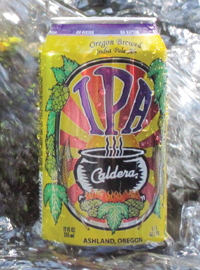 Caldera IPA Of all the taboos that craft brewers in the United States have systematically busted, the notion of craft beer in a can is arguably one of the most challenging. It certainly was to me. I listened with some incredulity when the charming Garrett Marrero of Hawaii brewery Maui first made the case to me. Surely canning was the ultimate insult, demonstrating the contempt in which the big brewers held the world’s greatest drink, and canned beer the epitome of mass produced industrial fizz?
But beyond the prejudice, canned beer makes sense. Cans offer numerous advantages that big brewers like for perfectly rational reasons – they’re lighter, sturdier, easier to pack and transport than bottles, and even have an environmental justification, particularly in cultures like the US and UK where returnable bottles are seen as a tough ask on customers. Modern can linings no longer taint beer with metallic flavours, and are fine for modern unpasteurised and naturally recarbonated craft beers. The one thing that doesn’t work so well in a can at the moment is refermentation, though some brewers are experimenting with “can conditioned” beers.
Cans were just as taboo among beer connoisseurs in the US as in Britain, but Caldera, alongside Maui, 21st Amendment, Oskar Blues and a few others, is now challenging that. Founded in the southern Oregon city of Ashland, not far from the California state line, in 1997, it originally produced only draught beer, and its IPA was one of its first recipes. When it decided to move into packaged beer in 2005, it settled on cans as the ideal vessel, the first Oregon micro to do so.
The IPA stands up very well to the process. This is very much a hop-led West Coast example of the style, dosed with Simcoe, Centennial and Amarillo to a hefty 94 IBU, but on a firm malt base that adds some Munich and Crystal to the two-row US pale malt that provides the backbone.
I enjoyed one of these colourful cans with lunch at a deli in central Portland, Oregon, whereThey’re relatively easy to come by. It was especially delightful to enjoy unusual quality beer in an otherwise perfectly everyday eating place – Portlanders take it for granted.
This amber beer turned out lightly hazy, with a thick, rocky slightly pinkish head. A relatively gentle whiff of pine and fennel set up a smooth palate with plenty of firm toffeeish malt well integrated with smooth, earthy, piny, peppery hops – considerably less overbearing than expected given the IBU. The hops clung on the swallow, but didn’t disrupt the smoothness of the finish, which remained approachable despite the vivid, drying bitter spicy notes.
I admit – I never expected to taste such a fine brew from a can.
 Glasses waiting to be filled at the Beermongers, Portland OR, September 2011 This is the fourth year of compiling a Top Tastings list and I’ve stuck to the same self-imposed rules as previously. Here are 30 beers I’ve tasted during 2011 which particularly stuck in my mind as the sensory highlights of the year, and a reaffirmation of why I spend so much time seeking out examples of the brewer’s art. They’re mainly beers new to me but not necessarily new beers – indeed some have been around for a very long time – and a few are resamplings of beers I’ve tried before.
They’re all seriously good beers but I wouldn’t say they’re necessarily the “best” I sampled – I’ve aimed for variety and beers that represent various beer travels and activities I’ve been involved with, and as before I’ve limited myself to one beer per brewer. There are a number of London beers, reflecting the work on my London guide; souvenirs of trips to Glasgow, Lille, Portland (OR) and San Francisco; unblended lambics tasted on my first Toer de Geuze; and yet another Fuller’s Vintage Ale from an astonishing vertical tasting.
Finalising the list is always painful but this year’s was particularly challenging, with so many excellent and memorable beers I simply didn’t have room for. So I’ve indulged myself for the first time with another 30 honourable mentions, listed briefly at the end. Both lists are in alphabetical order, with no further ranking intended, and the clickable links will take you to detailed tasting notes and background information.
- Bayerischer Bahnhof Gose Original Leipziger Bier Spezialität 4.6% Leipzig, Sachsen, Germany
- Bend Hop-Head Imperial India Pale Ale 9% Bend, Oregon, USA
- Boon Oude Lambik 3 jaar oud 6% Lembeek, Vlaams-Brabant, Vlaanderen
- Box Steam Funnel Blower 4.5% Colerne, Wiltshire, England
- Broumov Opat Kvasničák Pepper 5% Broumov, Králové Hradecký Kraj, Czech Republic
- Bruery Saison Rue 8.5% Placentia, California, USA
- Carlton & United Sheaf Stout 5.7% Melbourne, Victoria, Australia
- Full Sail Session Lager 5.1% Hood River, Oregon, USA
- Fuller’s Vintage Ale 2001 8.5% London W6, England
- Fyne Jarl 3.8% Cairndow, Argyll & Bute, Scotland
- Goose Island Bourbon County Coffee Stout 2010 13% Chicago, Illinois, USA
- Harveys Christmas Ale 8.1% Lewes, East Sussex, England
- Kernel Imperial Brown Stout London 1856 10.1% London SE1, England
- Kinshachi Nagoya Akamiso Lager 6% Nagoya, Chūbu, Japan
- Marble Old Manchester Ale 7.3% Manchester, England
- Mighty Oak Oscar Wilde 3.7% Maldon, Essex, England
- Moncada Notting Hill Amber 4.9% London W10, England
- Moonlight Death & Taxes 5% Santa Rosa, California, USA
- Nynäshamns Ångsbryggeri Bedarö Bitter 4.5% Nynäshamn, Södermanland, Sweden
- Orkney Dark Island Reserve (draught) 10% Quoyloo, Orkney, Scotland
- Pays Flamand Anosteké Brune Imperial Smout 8.5% Blaringhem, Nord, France
- Plzeňský Prazdroj Kvasnicový 4.4% Plzeň, Plzeňský kraj, Czech Republic
- Proef/Craig Allan Cuvée d’Oscar 7.5% Lochristi, Oost-Vlaanderen, Vlaanderen
- Redwillow Ageless Double IPA 7.2% Macclesfield, Cheshire East, England
- Steam/Epic Mayhem 6.2% Otahuhu, Auckland, New Zealand
- Texels Bock 7% Ouderschild, Texel (Noord-Holland), Netherlands
- Theillier Bavaisienne Ambrée 6.5% Bavay, Nord, France
- Tilquin Gueuze à l’ancienne 2011 6% Rebecq-Bierghes, Brabant-Wallonie, Wallonie
- Tryst Drovers 80/- 4% Larbert, Falkirk, Scotland
- Wells & Young’s Courage Imperial Russian Stout 2011 10% Bedford, Bedfordshire, England
Honourable Mentions: Adnams Tally-Ho 2007, Belhaven/Innis & Gunn Canada Day 2011, BrewDog Avery Brown Dredge, Brodie’s Red, Bouillon Médiévale Ambrée, Caldera IPA, Camden Town Show Boat, Deca/Struise Black Albert, Hardknott Vitesse Noir, Hopshackle Extra Special Bitter, Lambrate Imperial Ghisa, Lindemans Lambic 2 jaar oud (Tilquin), Logsdon Seizoen, Magic Rock Cannonball, Molen Hout & Hop, Moor Unfined Confidence, Murray’s Nirvana Pale Ale, Nøgne-Ø Imperial Stout, North Coast Merle, Olde Saratoga/Shmalz He’Brew Messiah Bold, Port/Lost Abbey Angel’s Share 2009, Rogue XS Old Crustacean, Sharp’s Turbo Yeast Unspeakable Abhorrence from Beyond…, Smuttynose Wheat Wine, Southern Tier 2xIPA, Stone Smoked Porter, Stowey Nettle Beer 2009, Thornbridge Italia Pilsner, Williams Brothers Profanity Stout, Windsor & Eton Conqueror 1075 Black IPA
Top Tastings 2011
ABV: 10%
Origin: Bedford, Bedfordshire, England
Website: www.wellsandyoungs.co.uk
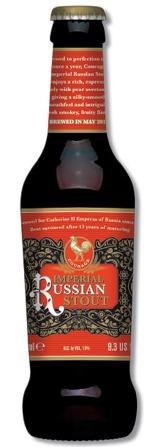 Wells & Young's Courage Imperial Russian Stout 2011 Excitement rippled through the beer world in Autumn 2011 as one of Britain’s most historic beer brands made an unexpected return from the dead. Courage Imperial Russian Stout can trace its lineage back to the Anchor brewery on the original site of William Shakespeare’s Globe theatre on Bankside, Southwark, which in 1781 became Barclay Perkins – a means to become “rich beyond the dreams of avarice” as Samuel Johnson commented when he handled the sale as the executor of deceased former owner Henry Thrale. The new owners lived up to Johnson’s word – the brewery became the world’s biggest, a major producer of the dark, vinous porter beers for which London was famed as the first capital of industrial brewing.
The beers now known as stouts evolved from strong porters which were labelled ‘stout’ in the sense of ‘strong’. Barclay Perkins led the field in exporting particularly stout bottled porters of 10% ABV or more to the Baltic nations, including to Russia which from 1703 had become more accessible with the creation of the port city of Sankt-Peterburg. These stouts even gained a following in the opulent royal palaces that brightened this massive country’s “window on the West” and were apparently appreciated by Empress and Autocrat of all the Russias Catherine the Great herself, acquiring the adjective ‘imperial’ not, as is still sometimes supposed, in honour of the British Empire but of the Russian one.
By the end of the 19th century prohibitive import duties had put an end to the Russian trade but the Anchor brewery continued brewing its imperial stout through the merger of Barclay Perkins with the nearby Courage brewery in 1955. Production was now limited to an annual brew packed in vintage dated bottles, now bearing the new owner’s brand, though the traditional technique of refermentation in the bottle was retained throughout the beer’s history – it was one of only five known British bottle conditioned beers still in production when the Campaign for Real Ale was founded in 1971, and one of the few beers then noted for its ageing potential.
By the 1970s Courage had relocated the brewing of Imperial Stout to its own facilities at Horsleydown at the south end of Tower Bridge, though continued to mature and bottle the beer at Barclay Perkins until the latter site finally closed in 1981. Production was relocated in 1983 a long way from its original home, at John Smith’s Magnet brewery in Tadcaster, North Yorkshire, where the end of the line was finally reached in 1993, the last year of regular production under the auspices of Courage.
Aside from a couple of minor glimmerings – some pasteurised bottles that briefly appeared on the Scandinavian market later in the 1990s, a one-off cask version at the 2003 Great British Beer Festival – the venerable line of brewing heritage appeared extinguished. Meanwhile other breweries moved into the gap on the shelves, notably Harveys, who recreated the stout imported into Russia from Britain in the 1820s by the A Le Coq company, itself perhaps derived from a Barclay Perkins recipe.
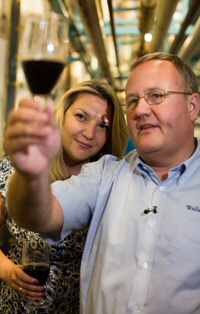 Wells and Young's head brewer Jim Robertson (foreground) admires the revived Courage Imperial Russian Stout with beer writer Melissa Cole, who helped recreate the beer. Pic: Wells & Young's Now, almost two decades after the last regular brew, Courage Imperial Russian Stout has reappeared thanks to Wells & Young’s. The enterprising new national struck a deal in 2007 to take over the production and marketing of the Courage brands from their then owner, Heineken, beginning with the standard and special bitters Courage Best and Director’s. In 2011 W&Y gained complete control of the brands and celebrated in splendid fashion in May with a new bottling of the historic strong stout, packaged in half pint bottles with red labels that pleasingly recycle elements of the iconic 1970s design.
Of course Young’s, one half of the original 2006 merger that created Courage’s new custodians, was once itself a London porter brewer, though much smaller than Barclay Perkins, and if Imperial Russian had ended up at Young’s historic Wandsworth site it would almost have been like coming home. Sadly that site now lays derelict and the 2011 version was produced at W&Y’s Bedford plant. But there’s a pleasing personal connection, as head brewer Jim Robertson is a former Courage employee who was involved in brewing the stout at Horsleydown in the early 1980s.
It was also noteworthy that W&Y chose to launch the new brew not in London, nor even in the UK, but at September’s Great American Beer Festival in Denver, Colorado, an indication of how the principal market for beers like this has shifted quite a long way west of the Baltic. Very little 2011 Imperial Stout found its way to British customers, and even beer writers and industry figures had to wait till December to get their tasting samples. Next year’s brew is expected to be more widely distributed.
Jim set out to recreate the stout he remembered from the 1980s, with pale, amber and black barley malts and lots of Styrian Goldings hops. Once again the beer is bottle conditioned. Although my sample was tasted relatively young at just over six months, it was already a mightily impressive and indulgent brew.
The beer poured near black, with a thick and creamy beige head. A sweet, caramelly aroma had notes of coffee, rum and raisin, a theme that continued in the rich and thick but sparkling palate, with fine chocolate and developing fruity raisin notes, a treacly sweetness and some biscuity malt. The finish was both drying and warming, with tannic notes and powdery bitter chocolate, swirled with complex esters that revealed late pear-like flavours.
The ageing potential is obvious, and I’m grateful to Wells and Young’s for sending me two bottles so I could stash one away to see what became of it. I also couldn’t resist cracking open one of my few precious remaining bottles of the 1993 John Smith version for comparison. It’ll be difficult to wait 18 years to taste the 2011 again.
Top Tastings 2011 (Ambrée), Beer sellers: Abbaye des Saveurs
ABV: 6.5%
Origin: Bavay, Nord, France
 Theillier La Bavaisienne (Ambrée) Northern French bières de garde are generally assumed to have deep historic roots in the local tradition of farmhouse brewing, though today’s best known and best selling brands are of more recent origin than you might expect. They’re revivalist beers developed in the 1970s (Jenlain) and 1980s (Choulette, Ch’ti, Trois Monts) by old established independent brewers who rightly decided that distinctive but accessible regional specialities might form the basis of a better survival plan than attempting to compete head-on with the lager giants.
Theillier, in the village of Bavay, an important capital in Roman times, is a little different. This small farmhouse-based operation is the oldest surviving brewery in the region and has stuck to making the same traditional styles throughout. Michel Theillier, in post since 1978, is the seventh generation of an unbroken family line that’s run the business since 1835, with production only halted once during that period, when the occupying Germans requisitioned the brewing vessels during World War I. Undoubtedly the recipes have evolved during that time, and today’s flagship Bavaisienne beers emerged in their current form in the 1980s too, but they can lay considerable claim to authenticity.
Most of the 1,000hl of annual production is sold locally but a small proportion is exported to the USA. I’ve never seen them in the UK, so I pounced when I found 250ml bottles of them on the shelves of the Abbaye des Saveurs in Lille. There are two Bavaisienne beers, the original amber and a blond, also available in 750ml bottles and only distinguishable by the label colours – blue and red respectively.
Both are brewed from pilsner malt and some coloured malt for the ambrée – some of the barley is grown locally but the historic decline of brewing in the region has largely stripped it of malting capacity so like most of its neighbouring breweries Theillier uses barley malted over the border in Belgium. Hops are Brewers Gold from Germany and yeast is obtained from Duyck, brewers of the Jenlain beers. These warm fermented beers undergo a traditional cold maturation period of a least a month at -1°C before being chill filtered but not pasteurised.
The blond was a splendid beer that poured golden with a fine white head and a richly malty, slightly lagery Germanic hop aroma. The crisp but full palate had a firm cereal character with a fine note of fruit, firm nuttiness, pleasant sweetness and a touch of slightly citric hops. The gently drying but still sweet finish became very nutty with a slightly warming note and a delicious natural grainy quality. Overall it was a well-muscled and quite straightforward beer but with a certain elegance.
The amber I found better still. It poured a classic amber with a little light beige head and a rather retiring slightly spicy aroma with nuts and cinder toffee. Like the blond the palate was firm and sweetish, with an emerging oozy lusciousness and plenty of malt character – biscuits, peanuts, even a touch of smoke. Gentle, almost medicinal spruce-like hints emerged before a nutty, coating and very satisfying finish with a light but building note of hops.
Again a straightforward beer but characterful, flawlessly made and a real taste of tradition.
I drew on the following book for some background details:
Gabriel Thierry 2010, Sur la route des bières du Nord-Pas-de-Calais, Bouvignies: Nord Avril
Top Tastings 2011
ABV: 7%
Origin: Ouderschild, Texel (Noord-Holland), Netherlands
Website: www.speciaalbier.com
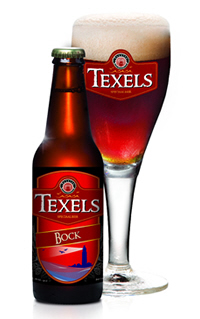 Texels Bock With my slightly sweet beer tooth, I’ve got a soft spot for the Dutch interpretation of bo(c)kbier, which has become an institution in its own right in the Netherlands, a seasonal focus for drinkers and a rallying point for the country’s beer consumer movement, PINT.
It’s even the subject of two competitions and a festival. “Het Beste Bockbier van Nederland” – the ‘best’ beer in the style – is chosen by a panel of beer experts at the Bokbierfestival organised by PINT in late October in Amsterdam, while “Het Lekkerste Bockbier van Nederland” – the ‘tastiest’ beer – is named by ordinary drinkers at a separate event organised by the Arendsnest beer pub supported by the specialist pub landlords’ organisation ABT.
Almost all Dutch brewers now produce a bok at the relevant time of year: old established brewers usually produce theirs in traditional cold-fermenting lager style while the newer micros tend to make boks as warm fermented ales. Standard strength for the style is up to 7%, though stronger variants are now made. One of the most successful standard strength microbrewed entrants in recent years is Texelse Bock, from what’s now one of the Netherlands’ most consistent and enduring new generation brewers.
The original brewery was founded in 1994 by Maurice Diks in an old dairy in the tiny fishing village of Oudeschild on Texel (pronounced ‘Tessel’ in Dutch), the southernmost and largest of the chain of Frisian islands that dots the northwest coast of the continent from the Netherlands to Denmark. It’s notably expanded since falling under new ownership in 1999.
Texels Bock is brewed from pale and roasted barley malt and hops, some of which is sourced from the island. Though a warm fermenting yeast is used, the beer undergoes extensive cold lagering before being bottle conditioned. The resulting brew was named tastiest bockbier in 2009, best in 2010, and both tastiest and best in 2011.
I encountered a bottle of the 2010 version at De Hems, Soho’s famous Dutch pub, which despite its authentic atmosphere and expat following is often disappointing as a source of more adventurous Dutch beers, so I considered myself lucky. I soon understood why the beer had been so widely praised.
Texeks Bock pours a lightly cloudy deep reddish-brown with a fine yellowy head. Notes of roasted malt, tar, banana, grapes and refined grassy hops are evident on a slightly flinty aroma. A luxurious palate has notes of burnt sugar, liquorice and cherry fruit – it’s sweet, but kept interesting with light hops and a chewy roast character.
The gently lingering finish is very well balanced, smooth and satisfying, with more malt, a bit of hop bitterness and a toasty edge. A classic, comforting cold weather brew.
For more background on the style, see Proef/SNAB Ezelenbok.
Top Tastings 2011 (bottled Cuvée d’Oscar), Beer sellers: Abbaye des Saveurs
ABV: 6.5% and 7.5%
Origin: Lochristi, Oost-Vlaanderen, Vlaanderen
Website: craigallan.fr, www.proefbrouwerij.com
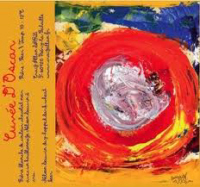 Craig Allan Cuvée d'Oscar (brewed at Proef) These beers are produced in Belgian Flanders by a Scottish brewer based in Picardy, northern France, and are decidedly international at heart. Craig Allan trained in Edinburgh but found the British brewing scene hidebound by tradition. He now lives in Méry-la-Bataille, in the Oise département, and is working with the owners of Lille’s Abbaye des Saveurs beer shop and specialist pub La Capsule to create a new range of beers. The aspiration is to open a brewery somewhere in the area but in the meantime brewing takes place at the ever reliable Proef in Lochristi, over the Belgian border, proving ground for so many interesting new beers.
Having shaken off the weight of one deep rooted brewing tradition, Craig isn’t likely to succumb to another one, and his beers are a long way from the bières de garde typical of French Flanders and Picardy, leaning instead towards US-influenced craft beer styles and a spirit of artisanal experimentation. The former tendency is most evident in Agent Provocateur, a self described hybrid of a Belgian golden ale and an IPA.
Tasted from a keykeg at La Capsule, this was a cloudy golden beer with a foamy white head and a very rich fruity aroma with notes of kiwi fruit, pineapple, resinous Cascade hops and some farmyard scents. There was less hoppy bitterness than I expected on the rich full palate, though tasty apricot jam flavours came through, and a solid maltiness coupled with the characteristic esters of Belgian yeast established the golden ale side of the hybrid. A lightly sweet, lightly drying finish had some vegetal hop character.
Much as the Agent provoked me to appreciation, Cuvée d’Oscar (‘Oscar’s brew’, named after Craig’s baby son) turned out to be something else entirely. My personal tastes veer more towards dark beer anyway, but this one was so original and unusual. It’s based on a wheat Bock of the Schneider Aventinus variety, with a “high proportion” of wheat malt joining Munich, crystal and chocolate barley malts in the grist, fermented with Bavarian wheat beer yeast and given a twist with a good dose of hops, including dry hopping with New Zealand Nelson Sauvin.
A keykeg sample was thick and chestnut brown, with a thick bubbly off-tan head, looking very much like a strong Belgian brown, but certainly not smelling like one. The aroma was very fruity, with grape and apricot notes, followed by an unusual and very complex toffee palate with apricot, pineapple, chocolate, malt loaf and a spicy, yeasty quality. A pleasant finish was packed with vivid and unusual flavours, blending chocolate and toffee notes with satsumas, grapes and a touch of roast, with spicy hops nicely balancing an overall biscuity sweetness.
The bottle conditioned version I bought in the shop left even more of an impression. This looked very similar, again with a foamy head, and again I noted grapes and apricots in a creamy aroma. These fruits showed up too in the complex, sweetish palate alongside chocolate, breakfast cereal, exotic spice and a developing hoppy bitterness, with a luscious bubbly texture adding to the sensual delight. Chocolate turned quite dark and stern in the finish with raisins, toffee and an emerging powdery dryness with roasted malt flavours rounded off by apricot nectar, with a touch of herbal, lettucey bitterness.
Another brewer to watch, without a doubt.
Top Tastings 2011
ABV: 7.2%
Origin: Macclesfield, Cheshire East, England
Website: redwillowbrewery.com
 Redwillow Ageless Double IPA Recent years have seen the emergence of a number of new, small British breweries that place themselves firmly in the international craft beer movement rather than the native real ale tradition. I hesitate to use the label “craft beer” as in my view even the most dyed-in-the-wool cask ale producers should be counted as craft breweries, but there’s certainly an emerging and influential group of young brewers who are determined to do things differently, often looking across the Atlantic for inspiration.
The most recent example I’ve encountered is Redwillow, founded in 2010 by Toby McKenzie in Macclesfield. I happened across a selection of Toby’s cask and bottle conditioned beers at one of Manchester’s burgeoning number of interesting beer venues, the Font Bar, in early December, and with limited time to spare opted to try a bottle of this US-inspired double IPA. It turned out to be a good choice.
The beer poured amber, with a very big puffy yellowish head. Grapefruit and tropical fruit notes quickly seized control of a toffeeish malt aroma. More tropical fruit exploded on a resinous palate with notes of spice, burnt toast, lavender, sesame oil and a slight washing up liquid hint – an impressive intensity of flavour but nowhere near as overbearing as some beers in this style. Pineapple, coconut and a building peppery note danced in a long finish, with a minerally, chewy quality and some spicy, seedy notes.
Top Tastings 2011, Beer sellers: Abbaye des Saveurs
ABV: 8.5%
Origin: Blaringhem, Nord, France
Website: www.bracine.com
 Brasserie du Pays Flamand Anosteké Brune Imperial Smout In November 2011 I was in Lille for a few days, checking out among other things the excellent beer range at the Abbaye des Saveurs shop in Vieux-Lille which will shortly feature in a Beer Sellers piece here. It was an opportunity to remind myself both of the joys of traditional bières de garde from this region of France, and to explore the work of some of the newer breweries now emerging, who take a more eclectic, internationally inspired approach to developing fine local products.
A good example of these is the Brasserie du Pays Flamand (‘Flemish Country brewery’), opened in 2006 by banker Mathieu Lesenne and commercial engineer Olivier Duthoit, both in their 30s and home brewers. For the first two years they contracted at another brewery, Saint-Germain, before opening at their current site in the village of Blaringhem on the edge of the Nord département, in a former distillery that once made spirits out of locally grown beet.
The brewery first made a success of its Bracine brand using substantial quantities of Flemish hops, before developing a new range of specialities, also well hopped but “more anchored in the brewing tradition”. Not long ago much of the area was Dutch speaking, as the place name attests, and the dialect survives – the brand name, Anosteké, is a dialect rendering of ‘tot de volgende keer’, ‘until the next time’.
I tried the Brune, which is subtitled curiously “imperial smout” [sic] – not quite an imperial stout. ratebeer.com has it as a Black IPA but I’m not so sure – there’s a definite stoutishness but also suggestions of an unusually well hopped and roasty dark abbey beer. Whatever, it’s a class act.
The beer is thick and near-black with a subsiding tan head. Fruit cake, tart plums, rum and coffee are evident on a rich aroma with a sweetish black treacle note, heralding a fruity palate that gradually dries, with lots of rich chocolate character, angelica, touches of raspberry and cherry fruit, a hint of brandy and a definite chewy hop note. A smooth, slightly clinging swallow leaves a complex finish with notes of tobacco, wood ash. Dry, roasty, charred and bitterish hoppy flavours linger over moreish sweetness. The next time can’t come too soon.
 Mixing it up on the wheels of steel. Or something. Pic: Ian Harris Next weekend (2-5 February 2012) sees the latest beer and music themed festival at the very welcoming and decent Snooty Fox pub at Canonbury. Yes, you’ll be able to enjoy some great beers, but you’ll also be able to catch a rare DJ set from yours truly.
I don’t usually write about my other activities on this blog but since this one has a beer link here’s a shameless plug. In my shady past I DJ’d for several years at the famous 100 Club in Oxford Street on Saturday nights, playing an eclectic mix mainly based around classic rhythm & blues and soul, with all kinds of other retro stuff thrown in from big band jazz and rock’n’roll through easy listening, ska and Latin to punk and the odd bit of indie. The event at the Fox is billed as a rock’n’roll themed weekend but my contibutions are likely to be a bit more eclectic than that.
Besides a moonlighting beer writer, the event also features 25 new wave craft beerswith a focus on ales with unusual flavours such as a Milk Stout from Dark Star, Plum Porter from Titanic and a special jasmine IPA from Thornbridge. A brand new beer from Revolution Brewing named Unknown Pleasures in honour of Joy Division will also be featured, so I might slip a Manchester miserabilist tune in my set too.
Copies of my book will of course be on sale and I’ll be happy to sign prepurchased ones. See you there on Friday 3 February: my set starts at 2100 and the pub is open till 0100.
For more see www.snootyfoxlondon.co.uk/events.html.
|
Cask 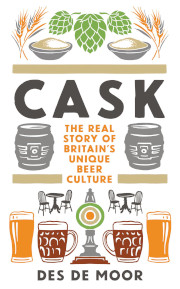 This pioneering new book explains what makes cask beer so special, and explores its past, present and future. Order now from CAMRA Books. Read more here. This pioneering new book explains what makes cask beer so special, and explores its past, present and future. Order now from CAMRA Books. Read more here.
London’s Best Beer 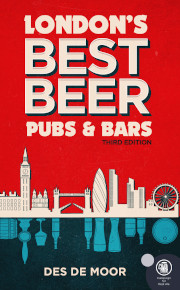 The fully updated 3rd edition of my essential award-winning guide to London’s vibrant beer scene is available now from CAMRA Books. Read more here. The fully updated 3rd edition of my essential award-winning guide to London’s vibrant beer scene is available now from CAMRA Books. Read more here.
|















